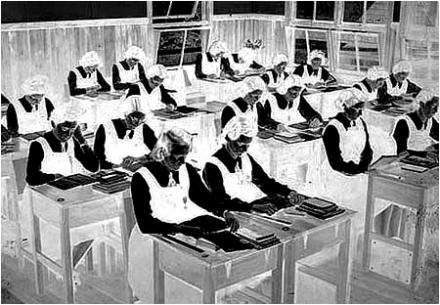Witness
by Azarin Sadegh
02-Sep-2008
It’s hard to be a victim. It is harder to be a witness.
Every man in my childhood city -- at some point in their lives -- was one of my father’s students. He had built the first high school of the town, one that allowed only boys. This accomplishment made him walk with pride, showing off his weighty influence.
We lived at the end of a narrow passageway, where, in summertime, the neighborhood boys played with a plastic ball in the dusty road, fought over their turn to ride the postman’s bicycle, and the silence of their absence was the sign of approaching cold.
Mrs. Mostofi, my first grade teacher, lived next door. Every time she made Halva for a religious mourning or celebration, her maid brought a plate to us. “We’re not poor,” my mother used to mumble. If by bad luck Mrs. Mostofi’s path crossed ours, she always gave me old candies and never missed a chance to pinch my plump cheeks with her sharp red nails.
“She’s going to be your best student,” my father would tell her.
“Don’t worry,” Mrs Mostofi would reply, smiling. “She’ll receive my special treatment.”
Living in that small city, on the first day of school I learned that relativity wasn’t just a theorem.
When we lined up and sang the national anthem and praised Shah, and when we prayed to God and cited meaningless Arabic verses, and when we entered class and she welcomed each of us, Mrs. Mostofi showed no sign of recognition.
The earth was turning more slowly than ever as I kept checking the time displayed on the clock hanging over her desk.
In the last hour of the class -- minutes before the bell rang -- she walked slowly between rows, staring at her black notebook, and called -- one by one -- the names of the classmates who never became my friends. I waited impatiently, wondering if she would call my name too. She never did. I was among the few not being chosen.
“This is our daily routine,” she said.
Sitting on an empty bench, I was taken by the sight of the last kid in the line. Leila Taghados was tall and older than the others. I had seen Leila walking home, going back to her village, looking tired and breathless. In the afternoons she worked with her mother as maid in a neighbor’s house. Everyone knew she had already failed first grade multiple times.
The last one in line, the color of Leila’s face and her restlessness and her silent obedience painted an image, a volume in space, a still moment in the flowing time which I never forgot.
Once Mrs. Mostofi closed her notebook and the line formed - from where she stood to the door - she went back to her desk and grabbed a long wooden ruler from a drawer. She wore the same look my father did in moments following a mistake either my mother or I made. She raised the ruler in the air with one hand and called the first girl in line with the other hand. “Your palms,” she said.
The girl didn’t move and hid her hands behind her back.
“Mehri, I told you to show me your palms,” Mrs. Mostofi yelled.
The sound of Leila’s heavy breathing overshadowed my own gasp; still it didn’t break the thick silence in the classroom.
Finally -- exposed, deceived, and defeated – Mehri gave up her spunk, stepped forward, crying, and raised her hands. Leila howled like a wounded dog, and all of us, in line or not, followed her lead.
It was the first lesson I learned on my first day of school: Going over each detail of my homework, finishing up the spelling check and writing the words the exact way Mrs. Mostofi expected, repeating the sentences of the first lesson: “My name is Sara. Father brings the bread. Mother cooks the dinner. I love my doll,” one hundred more times.
I knew I was going to be safe as long as my homework was perfect, as long as Mrs. Mostofi remained our family’s friend. As long as I didn’t object to her love -- each time she noticed my existence -- letting her claw my face. As long as I accepted her generosity by shoving her bitter candies down my throat. As long as I hoped -- and I prayed fiercely – that she would skip my name, that she would leave me alone on a bench, that she would give me the chance of becoming a witness, an accomplice, watching Leila’s misfortune, hiding my gratification, my conceit, my transcendence.
From that day on, every day, I shared Mrs. Mostofi’s act of purification, observing the line of the dehumanized, impatient for the echo of the school bell. Still, as their turn arrived, each one raised hands in the air without objection so Mrs. Mostofi didn’t have to scream or break a nail; she was a petite woman, a skinny, petite woman, but she used her utmost brutality to punish them for their hierarchical sins, offering a moment of blamelessness.
Two years later we left that small world and moved to Tehran where my father lost his reputation and authority, where for years, he missed his golden times of being someone influential, where we all became unidentified, undistinguished, and squeezed, just like Leila, just like Mrs. Mostofi’s maid -- just like any other little man -- waiting for the time of our punishment to arrive.
| Recently by Azarin Sadegh | Comments | Date |
|---|---|---|
| Life Across The Sun | 11 | Jun 11, 2012 |
| The Enemies Of Happiness | 12 | Oct 03, 2011 |
| Final Blast At the Hammer | 13 | Jul 18, 2011 |


